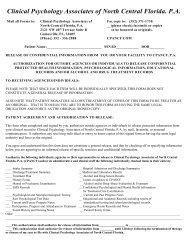cpancf service agreement form - Clinical Psychology Associates of ...
cpancf service agreement form - Clinical Psychology Associates of ...
cpancf service agreement form - Clinical Psychology Associates of ...
You also want an ePaper? Increase the reach of your titles
YUMPU automatically turns print PDFs into web optimized ePapers that Google loves.
Psychotherapy can have benefits and risks. Since therapy may involve discussing unpleasant aspects <strong>of</strong> your life,you may experience uncomfortable feelings like sadness, guilt, anger, frustration, loneliness, and helplessness. Onthe other hand, psychotherapy has also been shown to have many benefits. Therapy <strong>of</strong>ten leads to betterrelationships, solutions to specific problems, better occupational functioning, and significant reductions in feelings<strong>of</strong> distress. But there are no guarantees <strong>of</strong> what you will experience.The diagnostic assessment and mental status will involve an evaluation <strong>of</strong> your needs by reviewing your medical,social, occupational, family and mental health history as well as reviewing current and past symptoms andsignificant life events. In some cases further <strong>form</strong>al assessment through psychological or neuropsychological testingmay be required or suggested to further assess your abilities, personality or coping skills. We will <strong>of</strong>ten requestrecords from other providers that are or have been involved in your care and review these to coordinate care andassist in the assessment phase. Some <strong>of</strong> these records may not be received for some time, and will be incorporatedand reviewed as received. At the end <strong>of</strong> this assessment phase, unless in certain circumstances where we per<strong>form</strong>this assessment or consultation for a third party, we will <strong>of</strong>fer you our impressions based upon the in<strong>form</strong>ation wehave gathered. In some cases we will have only a consultative or assessment role. Should you continue beyond anassessment phase, we will discuss a treatment plan and treatment options.Where applicable, you should evaluate the assessment and treatment plan in<strong>form</strong>ation along with your own opinions<strong>of</strong> whether you feel comfortable working with your psychologist or resident. Assessment and therapy involves alarge commitment <strong>of</strong> time, money, and energy, so you should be very careful about the therapist you select. If youhave questions about our procedures, we should discuss them whenever they arise. If your doubts persist, we will behappy to help you set up a meeting with another mental health pr<strong>of</strong>essional for a second opinion.We have a number <strong>of</strong> brochures available regarding the nature <strong>of</strong> our assessment and therapy <strong>service</strong>s and additionalin<strong>form</strong>ation available on our website at CPANCF.COM.While we share <strong>of</strong>fices, each <strong>of</strong> the independent practices <strong>of</strong> C. Russell Clifton, Ph.D., Domingo Cerra, M.D. andWilliam Edenfield, Ph.D. are separate entities from CPANCF and are responsible for maintaining their own policiesand procedures. Other than when these independent practices specify in writing that they are per<strong>form</strong>ing <strong>service</strong>sunder contract with CPANCF, or under any Business Associate Agreement, CPANCF is not responsible fortreatment, care, <strong>service</strong>s, policies or procedures <strong>of</strong> these other practice. These practices are not responsible for anytreatment, care, <strong>service</strong>s, policies or procedures rendered by CPANCF other than when providing <strong>service</strong>s undercontract or a Business Associate Agreement.MEETINGS/SESSIONSThe normal psychotherapy intake assessment phase, involves gathering history and your presenting complaints aswell as assessing your mental status. This may take 1 to 2, and sometimes 3 to 4, 45-50 minute sessions. This variesgreatly since we assess and treat a wide variety <strong>of</strong> patients in a wide variety <strong>of</strong> situations. We will in<strong>form</strong> you aboutunusual departures from these expectations early in our meeting(s).If we mutually agree to begin psychotherapy, we usually schedule one 45 to 50-minute session (one appointmenthour <strong>of</strong> 45-50 minutes duration) per week at a time we agree on, although some sessions may be longer or morefrequent. In some cases as you progress, we may also reduce the frequency <strong>of</strong> visits. Once an appointment hour isscheduled, you will be expected to pay for it unless you provide 24 hours advance notice <strong>of</strong> cancellation for atherapy session or 72 hours advance notice in the case <strong>of</strong> full-day assessments. We may make exceptions, at ourdiscretion, for emergency or unusual circumstances. It is important to note that insurance companies do not providereimbursement for cancelled sessions. We may or may not reschedule assessments at our discretion. Repeatedmissed appointments may result in termination <strong>of</strong> therapy.2









